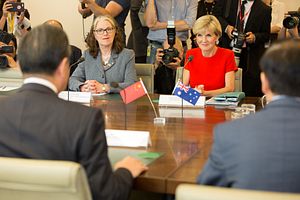In a move demonstrating the current uncertainty in the global order, Australia has decided to recall all of its current diplomatic heads of mission to help formulate a new foreign policy white paper. The conventional practice for policy formulation in Australia has been to send Canberra-based staff to liaise with the diplomatic corps in their country of station. That the Australian government has decided to hold an effective foreign policy convention with its ambassadors indicates it has serious concerns about future stability.
Of the move to recall Australia’s senior diplomatic staff, Foreign Minister Julie Bishop explained, “What I have asked them to do is to all come back to Australia at the one time in March so that we can harness the experience, the intellect, the observations, the perspectives, and insights of our most senior and experienced diplomats from around the world.”
Australia’s last foreign policy white paper was formulated in 2003 and provided the guiding principles for Australia’s national security and international engagement over the past 13 years. Although the similar policy-shaping “Australia in the Asian Century” white paper was released by the Gillard government in 2012, the document has been largely ignored by the subsequent Abbott and Turnbull governments. That said, a new more over-arching document was overdue to be constructed, and global events of the past year have given greater weight to both the process and the strategic policy prescriptions that will be born out of it.
With the unpredictability of the Trump administration, Australia’s primary security partnership will need to be reassessed. Although there is no credible alternative for an Australian security alliance, a new more precautionary path — including the strengthening of other security relationships — with need to be considered. The reshaping of the European Union following Brexit, and China’s increasing regional reach and its machinations in the South China Sea, will also be major factors in Australia’s strategic assessments.
Australia’s most prominent foreign policy dilemma remains the fact that its primary security relationship is with the United States, yet its largest trading partner is China. Any deterioration in the relationship between Beijing and Washington has the potential to destabilize both Australia’s security and economic interests. As China exerts more regional influence, and the United States contemplates ideas that may undo its own economic interdependence with China, Australia will need find a strategic posture that can mold itself to a shifting terrain.
As a country with a small (although wealthy) domestic market, maintaining the global public good of freedom of navigation, especially in the Asia-Pacific region, is essential to Australia’s national interests. While this is also essential to the interests of all other states in the current globalized era, a U.S. administration that may not quite understand its role in this phenomenon has the potential to undermine Australia’s exporting industries.
The consolidation of Australia’s trading relationships will need to be an essential component of the forthcoming white paper. With the Trans-Pacific Partnership all but dead, Australia will need to strengthen its bilateral trade agreements, in particular focusing on the grossly underdeveloped trading relationships with India and Indonesia. Indonesia and Australia both recognize that there is much work to be done in enhancing the relationship between the two neighbors. President Joko Widodo’s recent visit to Australia, and the Australian prime minister’s reciprocal visit to Indonesia earlier this week, demonstrate this commitment, but finding increased areas of common interest will require deeper engagement. Currently there are fewer Australian students learning Bahasa Indonesia than there were in the early 1970s, and the Australian government seems reluctant to promote this kind of grassroots civil society interaction, seemingly unaware of the potential it has to blossom into increased trade and security links, not just cultural exchange (as important as the latter is).
While moving strategically around the great powers may be necessary and important for Australia’s foreign policy, the country should not lose sight of its own region and the number of smaller states still seeking social and economic advancement. Australia’s new foreign policy doctrine should be sure to make development assistance a key component within its construction. The increased prosperity of Australia’s region is essential for its security and stability, alongside an ethical responsibility.
The recall of all its senior diplomatic staff is a sign that Australia is taking the current era of uncertainty very seriously. It is highly likely foreign policy conventions like this will become both normal and frequent for Australia’s foreign affairs establishment. It is of great importance that this new foreign policy white paper provides Australia with the flexibility to respond to any forthcoming movement in the global order. A rigid foreign policy doctrine may not work in the current era’s changing political landscapes and shifting norms.

































